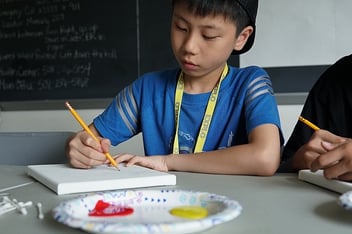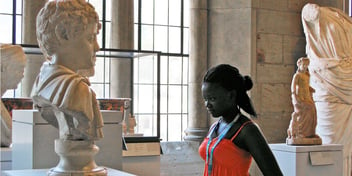How We Teach English at EXPLO
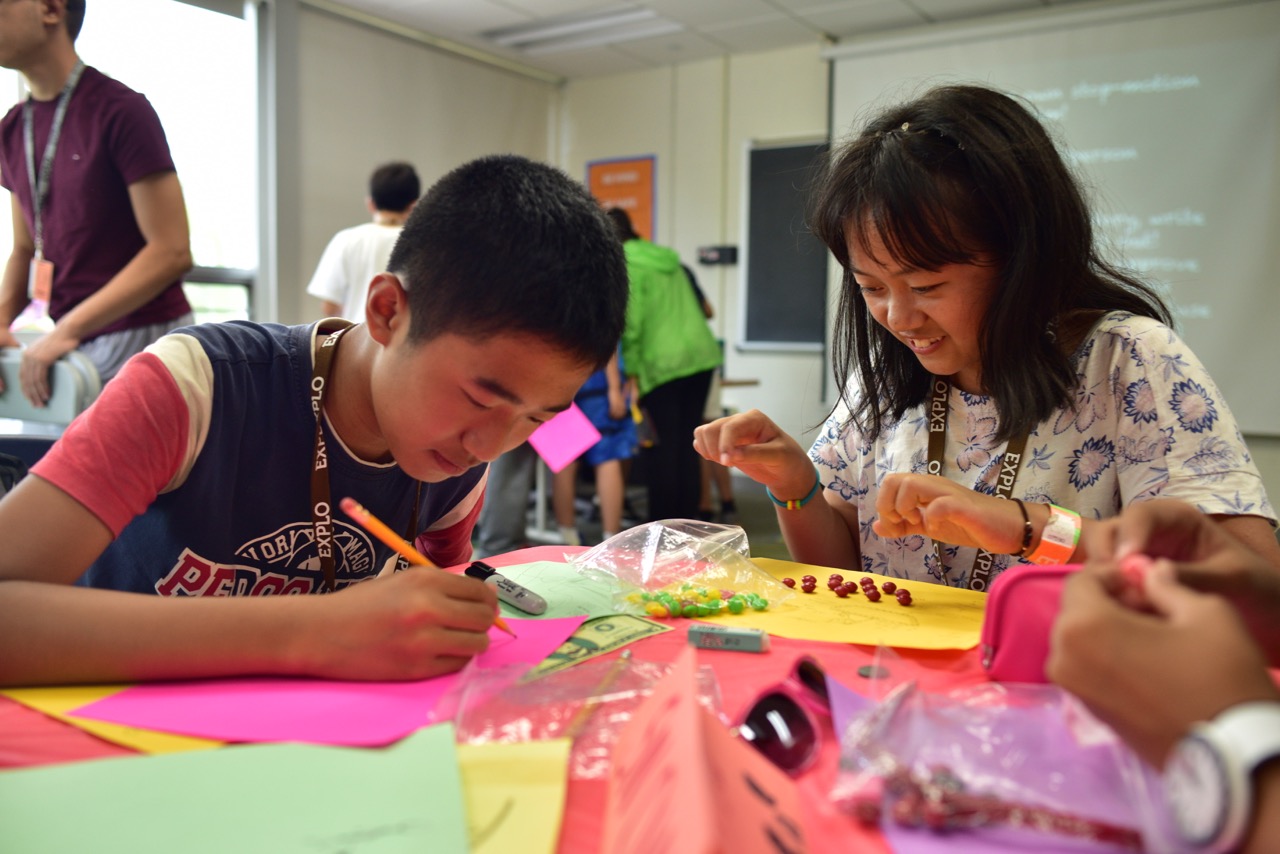
Something that surprises many families when they arrive at EXPLO is how many languages they hear. Français, Español, Deutsche, Português do Brasil, 普通話 … our students come from 40 states and 70 countries worldwide, and they bring their language and culture with them.
That’s why, when we created our English Immersion program four years ago, we had language at the forefront of our mind. We wanted to create a program that fostered playful discovery, and that used language to bridge culture. Here, language becomes more than just a series of letters, syllables, and syntactical conventions to be memorized. Instead, language is used as a vehicle that drives student engagement and unlocks discovery through various interdisciplinary and hands-on projects.
Through the combination of community, culture, and play, learning English at EXPLO becomes a truly authentic and impactful experience.
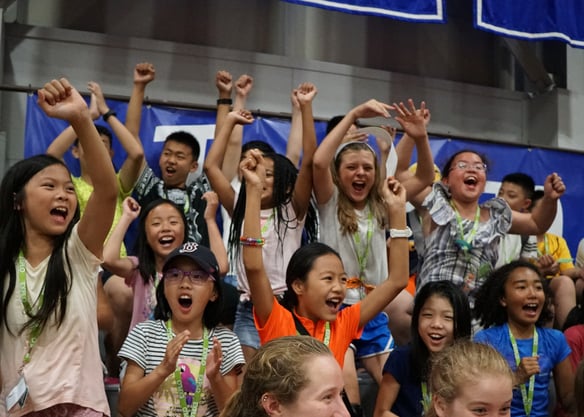
Learn English Alongside American Students
A key component of the EXPLO educational philosophy is that a sense of community is essential for meaningful learning to take place. This is true for all of our programs, but is particularly pertinent when it comes to our EXPLO English program.
During their three weeks at EXPLO, English Immersion students are an integral component of the EXPLO at Wheaton community. Through activities, workshops, playing on the quad, and attending weekend trips, English students are living and learning alongside native English speakers. These experiences outside of the classroom often become some of the most influential learning moments, helping students build confidence as they practice their speaking skills in context — not just theory.
“For all of our planned programming, our English Immersion students are out in the American world,” says EXPLO Assistant Director of Curriculum and Instruction Kristi Jacobi, who works year-round to develop curriculum for the English program. “There are so many unscripted moments (in the dining hall, on a bus, at the wall ball wall) where having the chance to interact with each other purely as kids is this unique opportunity to learn something from one another — and it isn’t facilitated by staff members.”
In this way, our EXPLO English students take control of their own learning, exchanging language and culture fluidly with their peers. When we step back and let the inherent curiosity of this age group drive them, they make their own discoveries about language and culture through friendship and play.
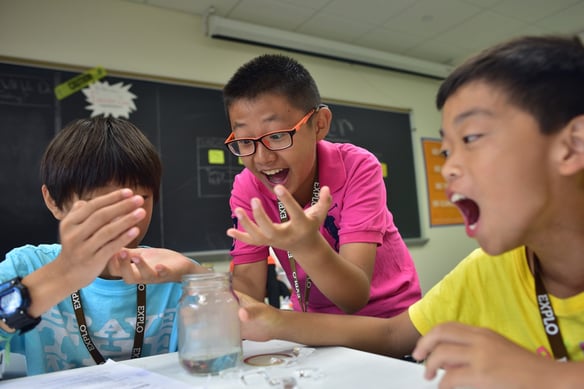
Hands-On Learning for English Immersion
At EXPLO, we believe that deep learning doesn’t mean boring and doesn’t require formality. This is true of our English Immersion program, too, where students learn through hands-on projects that require imagination and play. Here are some examples of activities that English Immersion students participate in to practice their reading and speaking skills:
- Design and launch paper rockets
- Record a weather report in English
- Plan an American-style birthday party
- Bake a whoopie pie following a recipe in English
- Create a logo of your EXPLO experience and describe your design
A Living Group of their Own
At the same time, we recognize how important it is for our English language learners to have an exclusive space where they can connect with each other and share their experiences being far from home, meeting new people, and stumbling through the funnier moments of learning something new.
All of our English students form community living groups within their residence halls with fellow English Immersion students that have traveled from all over the world. This community extends the classroom beyond its physical walls to the halls, living spaces, and meals that they share.
This shared experience strengthens their bonds to each other and their connection to the English language.
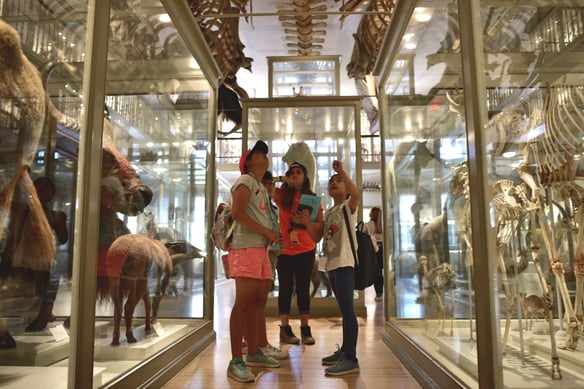
Experience American Culture
Weekends at EXPLO are for trips — another incredible way that English Immersion students can experience American culture and practice applying their speaking skills in context. Students choose from more than 30 trip offerings each weekend. Past trips have included:
- Boston Museum of Science
- Harvard Museum of Natural History
- Fenway Park (Red Sox) Tours
- Tea at the Taj Hotel
- Canobie Lake Park
- Caneoing + Kayaking
- Boston Duck Tours
- Simulated Sky Diving
- Blue Man Group
- New England Aquarium
- Museum of Fine Arts
- Paw Sox Minor League Baseball Games
- … and much more!
A Universal Language: Learning Through Play
Language shapes communities, defines identities, and bridges differences. It conveys meaning, it has power, and it’s inherently playful.
Across all of our programs at EXPLO, we believe that deep learning doesn’t mean boring and doesn’t require formality. This is true of our English Immersion program, too. We believe that learning a new language doesn’t have to be through rote memorization or drills. In fact, we would argue that language is better learned through play.
“All kids are fluent in play, regardless of what language they speak,” Jacobi says. “You can watch kids who don’t speak the same language play wall ball, paint, or play a game of tag.”
With play, there is always an open invitation.
When students are learning something through play, they are inherently having fun. They are comfortable, and so the barrier of nervousness or anxiety that comes so often with learning something new — particularly a new language — falls away. With play comes the necessity of exploration, collaboration, and self-expression.
That’s why our curriculum is intentionally built upon a foundation of hands-on experiences and projects that hook students in, and that get them excited about being a part of the discovery. Then, as they begin work on a stop-motion animation film project, a sock puppet show, a baking project, or paper-rocket making, they seek new language and vocabulary unique to the experience they are immersed in that will allow them to dive deeper into the material — and deeper into the English language.
Language and play become intertwined, so that the understanding of language is deeper and more authentic to the lived experience of each student.

